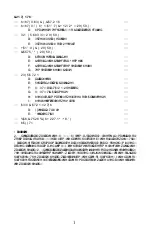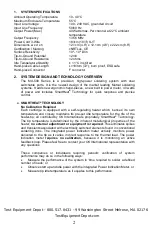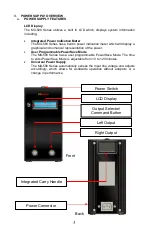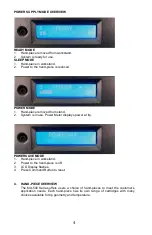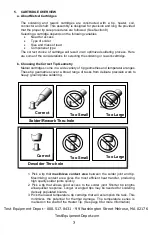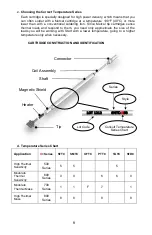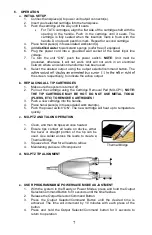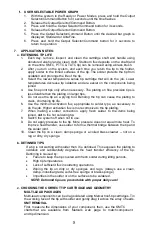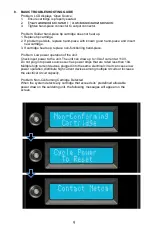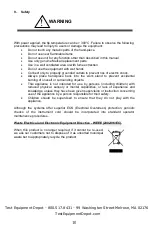
8
f.
USER SELECTABLE POWER GRAPH
1.
With the system in the Ready or Power Modes, press and hold the Output
Selector/Command Button for 3 seconds until the time flashes
2.
Release the Output Selector/Command Button.
3.
Press and hold the Output Selector/Command button for 3 seconds.
4.
Release the Output Selector/Command Button.
5.
Press the Output Selector/Command Button until the desired bar graph is
displayed; Standard or UltraFine.
6.
Press and hold the Output Selector/Command button for 3 seconds to
return to operation.
7.
APPLICATION NOTES:
a.
EXTENDING TIP LIFE
1.
Each day, remove, inspect, and clean the cartridge shaft and handle using
denatured alcohol and a clean cloth. Stubborn flux deposits on the shaft (and
on the entire SMTC, PTTC & TATC tip) can be removed using a brass brush.
2.
After you turn on the system, and each time you return the tip to the holder,
apply solder to the tinned surfaces of the tip. The solder protects the tip from
oxidation and prolongs the life of the tip.
3.
Select the lowest temperature series tip cartridge that will do the job. Lower
temperatures decrease tip oxidation and are easier on the components being
joined.
4.
Use fine point tips only when necessary. The plating on fine precision tips is
less durable than the plating on larger tips.
5.
Do not use the tip as a prying tool. Bending the tip can cause the plating to
crack, shortening tip life.
6.
Use the minimum activation flux, appropriate to solder type, as necessary to
do the job. Higher activation flux is more corrosive to the tip plating.
7.
When making a solder connection, apply fresh solder to the items being
joined,
not
to the hot soldering tip.
8.
Switch the system off when not in use.
9.
Do not apply pressure to the tip. More pressure does not equal more heat. To
improve heat transfer, use solder to form a thermal bridge between the tip and
the solder joint.
10. Clean the tip on a clean, damp sponge or a coiled brass cleaner -- not on a
rag or dirty, dry sponge.
b. DETINNED TIPS
If a tip is not wetting with solder then it is detinned. This exposes the plating to
oxidation and substantially degrades the heat transfer efficiency of the tip.
Detinning is caused by:
Failure to keep the tip covered with fresh solder during idling periods.
High tip temperatures.
Lack of sufficient flux in soldering operations.
Wiping the tip on dirty or dry sponges and rags. (Always use a clean,
damp, industrial grade, sulfur-free sponge or brass sponge)
Impurities in the solder or on the surfaces to be soldered.
NOTE: Detinned tips are preventable with proper daily care!
c. CHOOSING THE CORRECT TIP CARTRIDGE AND GEOMETRY
MULTI-LEAD PACKAGES
Multi-lead components can be drag soldered using Metcal hoof-tip cartridges. Tin
the working face of the tip with solder and gently drag it across the array of leads.
SMT REMOVAL
First, measure the dimensions of your component, then, use the SMTC
charts
that are available from Metcal’s web page to match component
and tip dimension.


